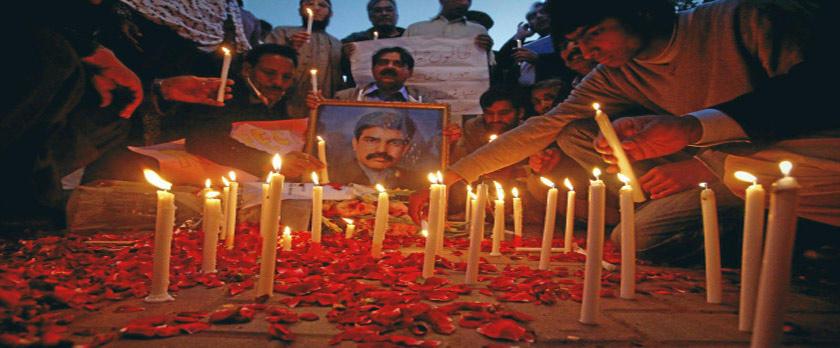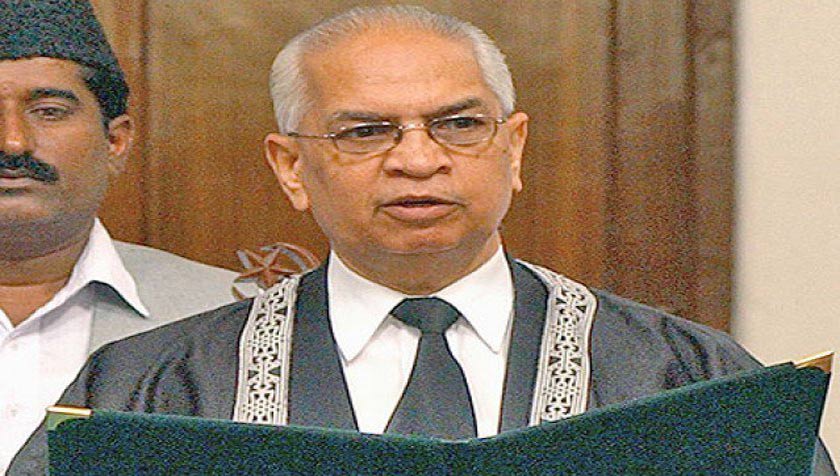Minorities Day: Honouring the white in the Pakistani flag

August 11 is marked as Minorities Day in Pakistan since 2009. Photo: Reuters
By Abdullah Zafar
Pakistan emerged on the map of the world seven decades ago as a consequence of one of the most historic divisions of land that resulted in the mass migration as well as sacrifice of thousands of people, the memories of which still haunt those who live to tell the tale.
Seventy years later, the country – home to a majority Muslim population, is moving towards a direction of honouring its diverse non-Muslim communities that have stood strong in the face of all difficulties and challenges.
Today marks the 7th National Minorities’ Day of Pakistan that is being observed across the country with national fervor and to remind everyone of the importance of the white in the flag.
While Pakistan has a predominantly Muslim population, it has several non-Muslim communities. It was back in 2009, 62 years later into the inception of Pakistan when a step in the right direction was taken, towards Jinnah’s Pakistan, by declaring August 11 as the ‘Minorities’ Day’.
Naumana Suleman – a human rights activist working on minorities in the country said, “The minorities of the country have faced a lot of religious violence as well as discrimination since 1947. Minorities’ Day undoubtedly is a great initiative, because it reminds us of the feats achieved by the minorities of Pakistan that have led the country in the realm of success many times,” she said.
While discussing the future of minorities in the country and why it is important for us to prosper, she said that further steps should be taken to promote and protect the rights of the minorities as there still is a long way to go for the minorities to enter the mainstream and make the country proud.
“Institutional life discrimination should be ended and syllabuses taught in our schools should be suitable for all, involving more about humanity and religious harmony. Jinnah’s address of August 11 should be a part of the constitution, and laws should be made accordingly.”
In his message on Minorities day this year, President Mamnoon Hussain said the democratic government was driven by the vision of the Quaid-e-Azam to protect rights of all minorities in the country and in this regard had already taken a number of steps for the welfare of non-Muslims. “We reiterate the pledge made by our great leaders of according equal treatment to all our citizens irrespective of their religion, caste and creed,” he said.
“The observance of Minorities Day reflects our commitment to integrate people of all faiths in the national life. We need to protect and promote democratic values and culture as an important tool to promote tolerance and harmony by ending extremism, intolerance and sectarianism,” he said.
A similar voice was echoed by the Prime Minister. PM Shahid Khaqan Abbasi vowed to realise the promise made by Quaid-e-Azam Muhammad Ali Jinnah to them, Radio Pakistan reported. He appreciated the role of minorities especially in social, general and health sector. While highlighting the steps taken for furtherance of the society, he said that the government had allocated five percent quota in jobs for minorities, besides setting aside seats in the Senate, National Assembly and Provincial Assemblies.
Darshan Lal landed a place in the national assembly after a cabinet reshuffle by newly elected Prime Minister Shahid Khaqan Abbasi. Lal is the first Hindu Minister in Pakistan since the late politician Rana Chandra Singh, who served in the government of the Pakistan Peoples’ Party two decades ago.
Speaking to Dunya News, Dr. Peter Jacob, former Executive Secretary of National Commission for Justice and Peace (NCJP), said that the first Minorities’ Day couldn’t be celebrated with much festivity back in 2009 because of the ongoing operation in Swat. While crediting Shahbaz Bhatti’s efforts, he said that it was a laudable act by the PPP government to observe the first Minorities’ Day. He also said that the minorities still have to suffer a lot but the ideal of Jinnah’s Pakistan is finally being revived and so, the revival should be celebrated.

A candlelight vigil in memory of Shahbaz Bhatti who was assassinated in 2011. Photo: Asia News
While talking about equality Jacob said, “In order to make egalitarianism functional, you have to recognise the identities and entities of the society. There should be an affirmative action in job quotas, and people should think above not only religious lines, but all kind of differences.” He said that times have changed and things are getting better with people having become politically conscious. But in order to get rid of problems like religious intolerance and social injustice, he said they need to learn more from this ideological learning curve.
In the spirit of honouring the white in our flag, this Minorities Day we pay a small tribute to some of the heroes this country has had over the past decades.
Bapsi Sidhwa
Bapsi Sidhwa is a Pakistani novelist of Parsi descent, and a recipient of various national and international level awards including Sitara-i-Imtiaz.
.jpg)
Bapsi Sidhwa is a recipient of various national and international level awards including Sitara-i-Imtiaz. Photo: White Star
Cecil Chauhdry
Group Captain Cecil Chaudhry was a Pakistani academic, human rights activist, and veteran fighter pilot. As a Flight Lieutenant, he fought in the Indo-Pakistani war of 1965 and later, as a Squadron Leader, in the Indo-Pakistani War of 1971. He is a recipient of Sitara-i-Jurrat and Tamgha-i-Jurrat.
.jpg)
Group Captain Cecil Chaudhry was a recipient of Sitara-i-Jurrat and Tamgha-i-Jurrat. Photo: PAF Archives
Dr. Ruth Pfau
Sister Dr. Ruth Katherina Martha Pfau was a German-Pakistani physician and nun of the Society of Daughters of the Heart of Mary. She devoted nearly 50 years of her life fighting leprosy in Pakistan. Pfau received the Hilal-i-Pakistan award presented by the President in 1989, and was also a recipient of Nishan-i-Quaid-e-Azam for public service and the Staufer Medal – the highest award of a German state.
.jpg)
Dr. Ruth devoted nearly 50 years of her life fighting leprosy in Pakistan. Photo: Vimeo
Justice Bhagwan Daas
Rana Bhagwandas was a senior judge and former acting chief justice of the Supreme Court of Pakistan. He was the country’s first Hindu and second non-Muslim Chief Justice.

Rana Bhagwandas was the country’s first Hindu and second non-Muslim Chief Justice. Photo: AP
Shahbaz Bhatti
Shahbaz Bhatti was a Pakistani politician and elected member of the National Assembly from 2008 till assasinated Shahbaz Bhatti was an elected member of the National Assembly. Photo: AP . He took numerous steps in support of religious minorities. These included the launch of a national campaign to promote interfaith harmony, the proposal of legislation to ban hate speech and related literature, the proposed introduction of comparative religion as a curriculum subject, the introduction of quotas for religious minorities in government posts and the reservation of four Senate seats for minorities.
.jpg)
Shahbaz Bhatti was an elected member of the National Assembly. Photo: AP


